A change of government, two budgets, new infrastructure, stalled resources projects – these are just some of the features of the year in business in Papua New Guinea. Here’s how Business Advantage PNG reported on 2019.
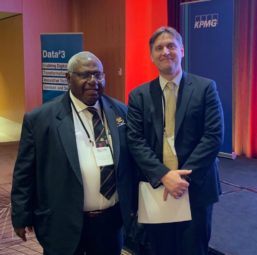
Wera Mori with Business Advantage International Publishing Director, Andrew Wilkins
A Foreign Investment Regulatory Authority (FIRA) Bill was tabled in Parliament at the start of 2019. It caught the business community by surprise and immediately sparked heated reactions.
In March, the bill as it was first introduced was withdrawn. The then-Minister for Commerce & Industry, Wera Mori, said he would ‘consult with the Investment Promotion Authority (IPA), who are responsible for regulating the foreign investment but who were not consulted on the Bill.’ Mori assured the business community of ‘the need to arrive at a solution where it will be conducive for people to continue to invest in the country.’
***
The 4,700 km long Coral Sea Cable System (CSCS), a submarine cable linking Sydney, Australia, to PNG’s Port Moresby and Honiara in the Solomon Islands, made plenty of headlines this year, and will continue to do so in 2020, when it is set to be connected. Combined with the Kumul Submarine Domestic Fibre Cable Network, the CSCS will improve PNG’s connectivity.
Deloitte’s Pete Williams, Chief Edge Officer at Centre for the Edge, said the CSCS would increase capacity by a thousand times to 20 terabytes.
***
In April, the State and Total, ExxonMobil and Oil Search signed the gas agreement for the US$10 billion (K33 billion) Papua LNG project.
The Papua LNG Gas Agreement had a number of negotiated conditions, including: a Domestic Market Obligation (DMO), which will provide gas for sustainable future domestic usage; a deferred payment mechanism for the State’s payment of prior costs, easing the financial burden associated with the State’s acquisition of its equity interest in the Papua LNG Project, and national content agreed conditions to ‘support local workforce development, involvement of local businesses and socioeconomic development of the communities impacted’.
***
In May, the IPA circulated information about what to expect from the review of the country’s Investment Promotion Act 1992. The IPA has also issued an explanatory memorandum for an expected Investment Promotion Authority (Amendment) Bill 2019.
***
Peter O’Neill announced his resignation as Prime Minister of PNG during a press conference in May. He also announced that ‘in consultation with coalition government partners, we have decided to ask Sir Julius Chan [Governor of New Ireland Province and Former Prime Minister from 1980 to 1982 and from 1994 to1997] to lead the team in Government for the remainder of this term of Parliament.’
***
The National Court put on hold Wafi-Golpu, a joint venture between Newcrest Mining and Harmony Gold, while it considered an application for leave for a judicial review.
***
On 30 May, PNG named James Marape, who resigned as Minister for Finance in 11 April 2019, as the eight Prime Minister of Papua New Guinea.
In his maiden speech to Parliament he said: ‘I truly want this country to be the richest black Christian nation on planet Earth.’
Two months after assuming the leadership of PNG, Marape made his official visit to Australia, where he met with Prime Minister Scott Morrison and delivered a speech at the Lowy Institute where he highlighted his intention to boost the agriculture sector in the country. ‘I don’t want PNG to be known as an oil and gas and gold country,’ he said. ‘I want PNG to be known as a country that is the food basket of Asia.’
***
In July, in a move that may have further repercussions, Fiji telco ATH bought into Papua New Guinea’s ICT market by purchasing a stake in Digitec Group.
***
Having flagged a review of the agreement soon after Marape’s ascendancy, Minister for Petroleum Kerenga Kua announced in August that the National Executive Council (PNG’s Cabinet) had ‘in principle’ agreed to ‘stand behind’ the Papua LNG Gas Agreement signed in April. The agreement covered the development of the Elk and Antelope gas fields in Gulf Province and the creation of PNG’s second LNG project, Papua LNG. The purpose of the review, Kua said, was to ensure the agreement was signed ‘in compliance with all applicable laws’.
***
The Business Advantage Papua New Guinea Investment Conference took place in Sydney in August, with a contingent of 120 business leaders and government officials travelling from PNG to meet with international delegates from Australia, New Zealand, the USA and the Pacific Islands.
Then-Minister for Commerce Wera Mori flagged the government’s intention to introduce Special Economic Zones (such as the Ihu Special Economic Zone in Gulf Province), while PNG Chamber of Mines President Gerea Aopi and Ok Tedi’s Peter Graham discussed the proposed changes to the country’s Mining Act.
Infrastructure was a focus, with Department of Works Secretary David Wereh’s unveiling the country’s new 20-year National Road Network Strategy.
***
Meanwhile, just days after presenting PNG Power’s plans for a ‘least cost’ power development plan, Acting Manager Director, Carolyn Blacklock resigned from the state-owned company in September. Her announcement came at a critical point in PNG Power’s restructure.
***
In September, Kerenga Kua finally confirmed the government would honour the Papua LNG agreement. The announcement meant that the Total-led project could move forward to the front-end engineering and design stage.
After the endorsement of Papua LNG, the government moved its focus to P’nyang gas field in Western Province and it became clear the two projects needed to proceed together.
***
In October, Newcrest executives at the International Mining and Resources Conference in Melbourne, Australia, said they were still waiting to continue discussion regarding Wafi-Golpu’s Special Mining Lease to start developing the project.
***
Minister for Treasury Ian Ling-Stuckey brought down a supplementary budget to addressed as what has been described as a ‘record budget deficit’ of K4.76 million. Ling-Stuckey said that K1.557 billion would be needed to finance the deficit.
***
Over 214,000 people enrolled to vote in the Bougainville Referendum which took place over two weeks in November.
***
After a slurry spill into Basamuk Bay on 24 August, the Mineral Resource Authority ordered the closure of Ramu Nickel’s operations. After the spill, local fishermen were advised to avoid fishing in the bay given potential contamination. Shortly after the closure announcement, Ramu Nickel resumed operations.
***
Innovation PNG 2019 took place at the Stanley Hotel in November, an initiative of the Port Moresby Chamber of Commerce and Industry (POMCCI) and Business Advantage International. The winners of the inaugural Innovation PNG Awards were announced: SP Brewery’s Cassava Project won the Large Organisation Category (more than 10 employees) and Sustainable Alluvial Mining Services win the Small Organisation Category (less than 10 employees).
***
With its acquisition of ANZ’s retail operations complete, Kina Bank sets it eyes on achieving 20 percent growth in 2020.
***
Wapu Sonk, Managing Director of Kumul Petroleum Holdings Limited (KPHL), said that the state-owned oil company is about to take a greater role in the country’s petroleum industry and will be able to take up to 100 per cent of equity in future oil and gas projects. The change is linked to a new Oil and Gas Act, flagged for 2020.
***
Treasurer Ling-Stuckey delivered PNG’s largest-ever National Budget in November, with a boost for capital investment and incentives to encourage SMEs. Concessionary loans underpinned the record budget deficit.



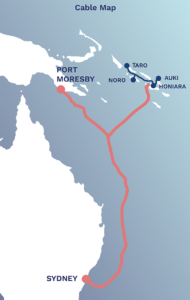

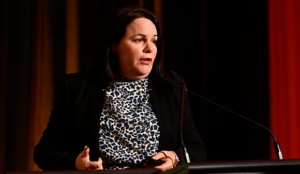
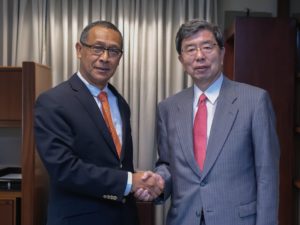
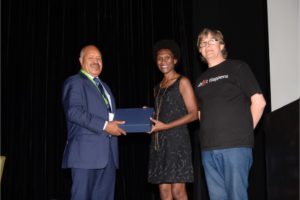





Speak Your Mind